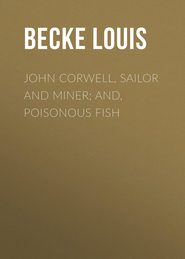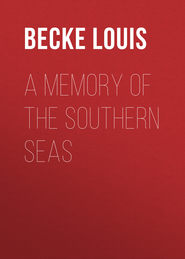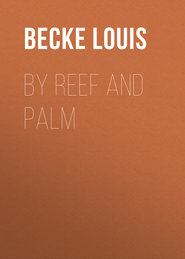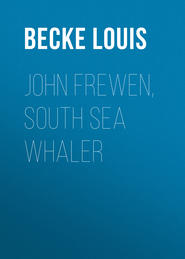По всем вопросам обращайтесь на: info@litportal.ru
(©) 2003-2024.
✖
Tessa
Настройки чтения
Размер шрифта
Высота строк
Поля
Harvey looked smilingly into her deep, tender eyes, half-suffused with tears.
“Go ahead, dear.”
“Go ahead, indeed! You rough, rude sailor! Any one would think I was a man by the way you speak to me… But, Harvey dear, listen… there was a man who wanted to marry me.”
Harvey was all attention at once. “Sit down here, little woman, and tell me who the–”
“Sh! Don’t swear, or I won’t tell you anything, not anything at all, about it.... Harvey dear, why do you want to go away fishing? Stay here, and help poor Mr. Atkins.”
“Who was the man, Tess?”
“Are you really, really going away for two whole days?”
“I am, sweet.”
“Harvey dear, I’ll tell you all about it. You won’t be angry?”
“All depends. Who was the man?”
His laughing eyes belied his assumed sternness of visage, for in her eyes there shone a light so serenely pure that he knew he had naught to dread.
“A very, very nice man, sir. Now try and guess who it was?”
“Old Schuler, the fat German trader at Yap.”
“Oh, you wretch, Harvey! He’s been married three times, and has dozens and dozens of all sorts of coloured children.... Now there! Guess again or I’ll twist this side of your moustache until I make you cry.... Harvey dear, who was the girl whose photograph was over your bunk in father’s schooner?”
“I forget. Most likely it was my sister Kate,” was the prompt reply.
“I don’t believe you, Mr. Harvey Carr. But I’ll find out all about you by and by. You’ll have to just tell me everything. Now guess again.”
“The captain of the Lafayette. He asked each of your sisters to marry him, I know, and I suppose you followed in turn as soon as you began to wear long dresses.”
“That horrible man! We all hated him. No, indeed, it was somebody better than the captain of a whaler.”
“Don’t be so superior, Tess. Your brother Ned hopes to be skipper of a whaler some day.”
“But Ned is very good-looking, and–”
“So was old Ayton before he lost his teeth, and one eye, and began ‘ter chaw terbacker’ and drink Bourbon by the gallon.... Beauty is only skin deep, my child.”
“Oh, you, you—I don’t know what to call you, but I do know that I have a round turn of your moustache in my hand, and could make you go on your knees if I liked. Now guess again; you’re getting ‘warmer,’ because it—he I mean—is a captain. Quick, and don’t struggle so. I mean to keep you here just as long as I please.”
“Well, then, old Freeman. He’s a captain, or was one about a hundred years ago, when he was much younger than he is now.” (Freeman was a nonogenerian settler on Ponapé and a neighbour of Tessa’s father.)
“Don’t be so silly! I’ve a great mind not to tell you at all, but as you haven’t whimpered when I pulled your moustache I shall tell you—it—he, I mean—was Captain Reade, of the United States ship Narrangansett. Now!”
Then all her raillery vanished in a moment. “He was a great friend of father’s, you know, Harvey; and first he asked father, and father said I was too young, and then when I was leaving school in San Francisco to come home he wrote to me and asked me if he could come and see me. And he did come, and asked me to marry him.”
“And you really didn’t care for him, Tessa?”
“Not a bit. How could I? Harvey, I never, never thought about anybody in the world but you,” and she looked into his face with swimming eyes as he pressed his lips to hers. “There, I’ll let you go now, dear. I can hear Huka and the others coming for you. But Harvey dear, don’t stay away for two whole days.”
An hour after leaving the village the canoes turned aside into a small narrow bay on one of the larger islands. The water was of great depth, from sixty to seventy fathoms, though the bay itself was in no part wider than a hundred yards. A solid wall of coral enclosed it on three sides, rising sheer up from the deep blue, and its surface was now bared and drying fast under the rays of the sun, for the rain had cleared off, and the sky was a vault of unflecked blue once more.
The natives had told Harvey and Roka that this bay was a spot famed as the haunt of a huge species of rock-cod called pura, some of which, they said, “took two strong men to lift,” and they were greatly pleased when they found that both the white man and Roka knew the pura well, and had eagerly assented to Harvey’s proposition that they should spend an hour or two in the place, and try and get one or two of the gigantic fish; as they had the necessary tackle—thick, six-plaited lines of coir fibre, with heavy wooden hooks such as are used for shark-fishing by the natives of the equatorial and north-west islands of the Pacific.
Had Harvey and his companions been ten minutes later in turning aside to enter the bay they would have been seen by Chard and Hendry ere they descended the coral mound at the north end of the lagoon, and much of this tale would not have been told. For had the destroyers of poor Oliver and his crew discovered the canoes they probably would at once have launched their boat again, and have put to sea, or at least prepared themselves for an attack. But great events so often come of small things.
For nearly an hour Harvey, Roka, and Huka fished for pura from the coral ledges, but without success. They had baited their hooks with flying-fish, as was the practice of the Pikirami people.
“Master,” said Roka presently to Harvey, “never have I had good luck with flying-fish when fishing for pura in mine own land of Manhiki. ‘Tis a feke[1 - Octopus.] that the pura loveth.”
“Ay, Roka, feke is a good bait for the pura and all those great fish which live deep down in their fale amu” (houses of coral). “Let us seek for one on the outer reef. Then we shall return here. It is in my heart to show these our good friends of Pikirami that there is one white man who can catch a pura.”
Roka showed his white teeth in an approving smile. “Thou art a clever white man, and can do all those things that we brown men can do. Malua hath told me that there is no one like thee in all the world for skill in fishing and many things. Let us go seek feke.”
The rest of their party—the men from the Motutapu and the Pikirami people—were busily employed in preparations for cooking, some making ready an oven of red-hot stones, others putting up fish and chickens in leaf wrappers, and Malua and two Pikirami youths of his own age were husking numbers of young drinking-nuts.
Telling his native friends that he would return in an hour or two, or as soon as he had caught some feke. Harvey set off, accompanied by Roka and Huka, the latter carrying a heavy turtle-spear, about five feet in length from the tip of its wide arrow-headed point to the end of the pole of ironwood.
Turning to the eastward, they struck into the cool shade of the narrow strip of forest which clothed the island from the inner lagoon beach to the outer or weather side, and Harvey at once began to search among the small pools on the reef for an octopus, Huka with Roka going on ahead with his turtle-spear. In the course of a quarter of an hour they were out of sight of each other.
For some time Harvey, armed with a light wooden fish-spear, carefully examined the shallow pools as he walked along over the reef, and after he had progressed about a mile he at last saw one of the hideous creatures he sought lying on the white sandy bottom of a circular hole in the reef, its green malevolent eyes looking upward at the intruder. In an instant he thrust the spear through its horrible marbled head, and drew it out upon the rocks, where he proceeded to kill it, a task which took him longer than he anticipated; then carrying it back to the shore, he threw the still quivering monster upon a prominent rock and set out again in search of another, intending to follow his native comrades, who were in hopes of striking a turtle.
As he tramped over the reef, crushing the living, many-coloured coral under his booted feet, his eyes were arrested by some objects lying on the bottom of a deep pool. He bent down and looked carefully—five magnificent orange cowries were clinging closely together upon a large white and sea-worn slab of dead coral.
An exclamation ot pleasure escaped from him as he saw the great size and rich colouring of these rare and beautiful shells.
“What a lovely present for Tessa!” he thought; and taking off his shirt he dived into the clear water and brought them up one by one. Then with almost boyish delight he placed them beside him on the reef, and looked at them admiringly.
“Oh you beauties!” he said, passing his hand over their glossy backs; “how delighted Tessa will be! No one else has ever had the luck to find five such shells together. I’m a tagata manuia lava,[2 - A man with extraordinary good luck.] as Malua says.”
He picked the shells up carefully, put them into his wide-brimmed leaf hat, which he then tied up in his shirt, and taking his spear again made towards the shore, too pleased at his good fortune to trouble any further about another feke and only anxious to let Roka and Huka see his prizes.
Half-way to the shore he paused and looked along the curving line of beach to see if either of them were in sight; then from behind a vine-covered boulder not fifty yards away a rifle cracked, and he fell forward on his face without a cry.
CHAPTER XII
Soon after they had left Harvey the Manhikian and Huka parted, each preferring to take his own way, Roka laughingly telling his comrade that although he, Roka, had no spear, he would bring back a turtle.
“In my land of Manihiki we trouble not about spears. We dive after the turtle and drag them ashore.”
“Thou boaster,” replied the Savage Islander good-naturedly, as he stepped briskly down the hard, white sand towards the water, his sturdy, reddish-brown body naked to the waist, and his brawny right arm twirling the heavy turtle-spear about his head as if it were a bamboo wand. “I go into the lagoon, whither goest thou?”
Roka pointed ahead. “Along the beach towards the islet with the high trees. May we both be lucky in our fishing.”
In a few minutes he was out of sight and hearing of his shipmate, for the beach took a sudden curve round a low, densely-verdured point, on the other side of which it ran in an almost straight line for a mile. Suddenly he paused and shaded his eyes with his hand as he caught sight of a dark object lying on the sand.











